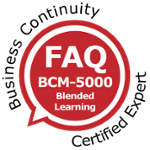Building a Resilient Kinderland: A Practical Guide to Business Continuity Management
[Project Management] [Corporate MBCO]
Corporate Minimum Business Continuity Objective
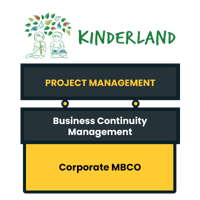
 Resilience is not just a strategic priority but a moral obligation for Kinderland Singapore, a trusted leader in early childhood education.
Resilience is not just a strategic priority but a moral obligation for Kinderland Singapore, a trusted leader in early childhood education.
The Corporate Minimum Business Continuity Objective (Corporate MBCO) is the cornerstone of this commitment.
It defines the non-negotiable level of services Kinderland must sustain during disruptions to protect child safety, uphold educational quality, and maintain regulatory compliance.
Aligned with ISO 22301 standards, the MBCO translates Kinderland’s mission into actionable, measurable targets, ensuring that the organization remains a beacon of reliability for parents, staff, and regulatory bodies, even in crises.
By establishing clear recovery priorities and performance thresholds, this framework bridges the gap between Kinderland’s operational realities and its aspirational vision of uninterrupted excellence.
The Corporate MBCO focuses on four pillars critical to Kinderland’s operations: child supervision, curriculum delivery, health compliance, and stakeholder communication.
Each pillar is underpinned by quantifiable metrics—such as maintaining a 1:5 staff-to-infant ratio during evacuations or restoring 70% of core curriculum components within 24 hours—that ensure accountability and precision.
These objectives are not arbitrary; they reflect Kinderland’s legal obligations under Singapore’s Early Childhood Development Agency (ECDA) guidelines, its duty of care to families, and its commitment to fostering lifelong learners.
By embedding resilience into its DNA, Kinderland transforms potential vulnerabilities into opportunities for trust-building and operational refinement.
Definition
 The Corporate MBCO defines the minimum level of critical services Kinderland Singapore must deliver during a disruption to fulfill its mission, meet stakeholder expectations, and comply with regulatory obligations.
The Corporate MBCO defines the minimum level of critical services Kinderland Singapore must deliver during a disruption to fulfill its mission, meet stakeholder expectations, and comply with regulatory obligations.
This objective ensures that the organisation maintains its core operational capabilities while recovering from an incident.
Corporate MBCO Statement
During a disruption, Kinderland Singapore will maintain the following minimum critical services within the specified timeframes to ensure child safety, regulatory compliance, and continuity of essential operations:
Child Supervision & Safety
-
Minimum Service Level:
Ensure 90% of enrolled children are safely supervised and cared for in secure facilities or alternative locations. -
Metric:
- Maintain a child-to-staff ratio compliant with ECDA standards (e.g., 1:5 for infants, 1:8 for toddlers).
- Activate emergency protocols (e.g., evacuation, lockdown) within 15 minutes of a disruption.
Curriculum Delivery & Learning Activities
-
Minimum Service Level:
Deliver 70% of core curriculum components (e.g., literacy, numeracy, socio-emotional learning) to ensure children’s developmental progress. -
Metric:
- Resume structured learning activities within 24 hours of a disruption.
- Ensure access to basic teaching materials (physical or digital) for 80% of students.
Health & Hygiene Management
-
Minimum Service Level:
Maintain 100% compliance with ECDA and Ministry of Health (MOH) hygiene and safety standards. -
Metric:
- Ensure daily sanitation of facilities and availability of hygiene supplies (e.g., disinfectants, first-aid kits).
- Isolate and manage health risks (e.g., infectious diseases) within 1 hour of detection.
Communication with Stakeholders
-
Minimum Service Level:
Provide timely and accurate updates to parents, staff, and regulatory bodies during disruptions. -
Metric:
- Issue initial incident notifications to parents and authorities within 30 minutes of a disruption.
- Maintain communication channels (e.g., SMS, email, app alerts) at 95% uptime.
Key Dependencies to Achieve Corporate MBCO
To meet the MBCO, Kinderland Singapore relies on:
-
Staff Availability:
At least 60% of educators and support staff must be accessible during a disruption. -
Facility Readiness:
At least 50% of operational centers (or pre-arranged alternative sites) must remain functional. -
Critical Supplies:
Maintain a 7-day reserve stock of essential items (e.g., food, hygiene products, teaching aids). -
IT Infrastructure:
Core systems (e.g., parent communication platforms, student records) must recover within 4 hours of failure.
Recovery Time Objectives (RTOs)
-
Critical Services Restoration:
Resume minimum service levels within 24 hours for all core operations. -
Full Operational Recovery:
Restore 100% of services within five business days post-disruption.
Alignment with ISO 22301 Requirements
-
Measurable:
For objective evaluation, metrics are quantified (e.g., percentages, timeframes). -
Stakeholder-Centric:
Prioritises child safety, parental trust, and regulatory compliance. - Risk-Informed: Reflects risks identified in Kinderland’s Business Impact Analysis (BIA).
This Corporate MBCO ensures Kinderland can uphold its mission during disruptions while meeting legal obligations and stakeholder expectations.
The next step is integrating these objectives into actionable BCM Plans and recovery strategies.
Summing Up …
The Corporate Minimum Business Continuity Objective (Corporate MBCO) for Kinderland Singapore codifies the organisation’s resolve to prioritize child welfare and operational integrity during disruptions.
It mandates measurable thresholds, such as safeguarding 90% of enrolled children within 15 minutes of an incident and ensuring 100% compliance with health and hygiene standards, to minimise service degradation.
These targets are not standalone goals but interconnected components of a holistic strategy that safeguards Kinderland’s reputation, regulatory standing, and stakeholder relationships.
By anchoring its MBCO in real-world risks—from staff shortages to IT failures—Kinderland ensures its pragmatic and proactive continuity plans.
The MBCO is not a static document but a dynamic blueprint for resilience. It acknowledges dependencies such as staff availability, facility readiness, and IT infrastructure while setting clear Recovery Time Objectives (RTOs)—including restoring critical services within 24 hours and full operations within five business days.
 This approach ensures that Kinderland’s response to disruptions is swift, structured, and aligned with its mission. As the organisation transitions to risk assessments and Business Impact Analysis (BIA), the MBCO provides the foundational clarity needed to allocate resources, train staff, and build redundancies.
This approach ensures that Kinderland’s response to disruptions is swift, structured, and aligned with its mission. As the organisation transitions to risk assessments and Business Impact Analysis (BIA), the MBCO provides the foundational clarity needed to allocate resources, train staff, and build redundancies.
Ultimately, it reinforces Kinderland’s pledge that no disruption will compromise its role as a guardian of childhood potential.
|
Building a Resilient Kinderland: A Practical Guide to Business Continuity Management |
||||
| Business Impact Analysis Questionnaires (BIAQ) Sample Submission | ||||
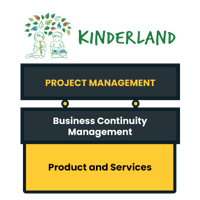 |
 |
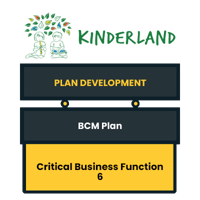 |
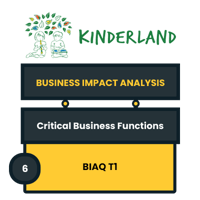 |
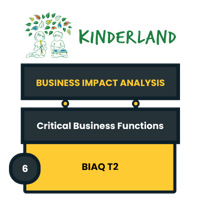 |
More Information About Business Continuity Management Courses




![Register [BL-B-3]*](https://blog.bcm-institute.org/hs-fs/hubfs/hub_generated/resized/19a8306f-6b76-45ff-8585-95111f393aeb.png?width=200&height=56&name=19a8306f-6b76-45ff-8585-95111f393aeb.png)



![FAQ [BL-B-3]](https://blog.bcm-institute.org/hs-fs/hubfs/hub_generated/resized/9b7f5669-8ad6-450b-a98f-5f5d49ebfc8e.png?width=150&height=150&name=9b7f5669-8ad6-450b-a98f-5f5d49ebfc8e.png)
![Email to Sales Team [BCM Institute]](https://blog.bcm-institute.org/hs-fs/hubfs/hub_generated/resized/83ae9ad3-affc-416e-8f51-64218d6d98f2.png?width=100&height=100&name=83ae9ad3-affc-416e-8f51-64218d6d98f2.png)
